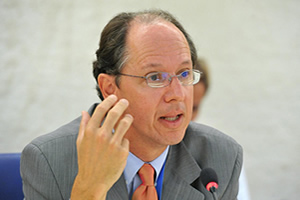Pablo de Greiff, former Special Rapporteur (2012-2018)
Special Rapporteur on truth, justice and reparation

Pablo de Greiff (Colombia) took up his functions as Special Rapporteur on the promotion of truth, justice, reparation and guarantees of non-recurrence on 1 May 2012. Since 2015 he is Senior Fellow and Director of the Transitional Justice Program at the Centre for human rights and global justice at the School of Law, New York University.
From 2001 to 2014 he was Director of Research at the International Center for Transitional Justice (ICTJ). He was previously an associate professor with tenure in the Philosophy department at the State University of New York at Buffalo, where he taught ethics and political theory. He has lectured in many countries and universities across Europe and the Americas, including at the European University Institute, Yale, Harvard, Columbia, NYU and academic events in Morocco, Colombia, Chile, Germany, amongst others. Previously, he was a recipient of the Laurence S. Rockefeller fellowship at the Center for Human Values, Princeton University, and held a concurrent fellowship from the National Endowment for the Humanities.
Mr. de Greiff has published extensively on transitions to democracy, democratic theory, and the relationship between morality, politics, and law, and is in the board of editors of the International Journal of Transitional Justice and of several book series related to the topic. His most recent publications include articles entitled “Truth without facts. On the Erosion of the Fact-Finding Function of Truth Commissions” (forthcoming); “Transitional Justice and Development” (2014); “On Making the Invisible Visible: The Role of Cultural Interventions in Transitional Justice Processes” (2014); “El papel de las cortes constitucionales en la regulación de conflictos” ( 2013); “Theorizing Transitional Justice” (2012); “Some thoughts on the Development and Present State of Transitional Justice” (2011); “Establishing the Links between DDR and Reparations” (2010); “Articulating the Links between Transitional Justice and Development: Justice and Social Integration (2009); as well as books on Transitional Justice and Development (2009); Justice as Prevention (2007); and Handbook of Reparations (2006).
He has also provided advice to a wide range of Governments, the UN and non-governmental organizations, particularly victims’ organizations, truth commissions and multilateral institutions in the area of transitional justice, gender issues and the linkages between justice, security and development.
VIEW THIS PAGE IN: